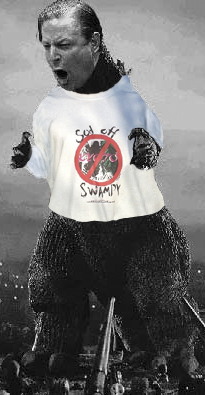What Is It With Chicago?
Foie gras and now…WAL-MART.
Brushing aside warnings from Wal-Mart that it might take its business elsewhere, the City Council approved an ordinance Wednesday that makes Chicago the biggest city in the nation to require big-box retailers to pay a “living wage.”
…The ordinance passed 35-14 after three hours of impassioned debate.
The measure requires mega-retailers with over $1 billion in annual sales and stores of at least 90,000 square feet to pay workers at least $10 an hour in wages plus $3 in fringe benefits by mid-2010. The current minimum wage in Illinois is $6.50 an hour and the federal minimum is $5.15.
Hell, I’d wear a smiley blue vest for that ~ or Home Depot orange, because it affects them, too. But it sort of defeats the purpose, doesn’t it? Besides being hugely discriminatory, the chains’re competitive because they pay entry level wages. The catch being if you stick around long enough, you have the potential to actually make a living. No, you’re not buying a Ferrari, but it IS a living. This was pushed through by a coalition of churches and rights groups, but there were other voices that aren’t going to be heard. One of them was the bishop of an Apostolic Church of God* who was worried about the new jobs that are going to never open. Or the old ones that completely disappear because of this; Jobs that folks who aren’t so well off and want to work need desperately. But that extra $3 for two minimum wage earners adds up to another body at minimum wage. How are the big boxes going to make up the additional cost? I’d lay money on letting somebody go.
We’ll see if this survives the court challenges that are coming. There are other ‘living wage’ laws in other cities and no one’s folded up their tent. But I haven’t seen any figures on what the impact was on the communities’ employment figures, their retail expenditures or what it cost in lost tax revenue from a smaller number of workers.
*corrected ~ see complete story below
UPDATE: The full AP Report notes :
Other cities with living-wage laws include Santa Fe and Albuquerque in New Mexico; San Francisco; and Washington.
…The first Wal-Mart in Chicago itself is set to open in September, and the Bentonville, Ark.-based company has more than 40 other stores within 50 miles of the city.
Wal-Mart said that its average hourly wage is almost $11 an hour in the Chicago area and that the lowest wage that will be paid at the new West Side store will be $7.25 an hour.
The AP article with the background info here.
“I think it’s immoral to pass laws that will rob people of jobs. I think there’s something wrong with that,” said Bishop Arthur Brazier of the Apostolic Church of God on the city’s South Side.
Lisa Cox is transferring from a Wal-Mart store in the Chicago suburbs to the new West Side store just five minutes from her home.
“Now I can just walk down the street to work,” said Cox, 40, who during her eight years working at Wal-Mart has advanced from a $7.25-an-hour cashier to a $13.40-an-hour customer service supervisor.
Chicagoland Chamber of Commerce president Jerry Roper warned that the business community will push back if the measure passes.
“We will go back to the business community after Wednesday … and make sure they know which aldermen voted to kick thousands of jobs … for Chicagoans and millions of dollars of tax revenues that could be helping our schools out of Chicago,” Roper said.

That’s Chitown politics for ya. The aldermorons love to whip up stupidity like this to pull attention away from all the murders, rapes, and especially corruption. Worst part of all, the sheeple will vote them back into office time and time again.
The town is run by halfwits.
Seriously, one of the biggest constituencies here is the unionized left. That’s where all this comes from. They don’t much care if blacks or hispanics get thrown over the side, as long as they can feel like they’ve made big business suffer. It’s a mania, and it hits schools (they don’t want private companies tutoring under NCLB), the big stores, and the tax breaks that business get for moving into high rises downtown.
One local city which wanted to keep out big box stores (to “protect” their local businesses) blocked an IKEA from opening within the city limits. So IKEA bought property just outside the city limits.
You mean “our” IKEA? 😉 ROFL-Funny, they also put a freaking Four Seasons HOTEL across the “street”, still just outside city limits. Hahahaha!
(A warm Swill welcome, McKreck!)
NYC found out that being prohibitively expensive for box stores to open meant they opened in New Jersey instead. All that tax revenue went out over the bridges and through the tunnels and into local NJ coffers. I know NYC tried to tax you returning with your Ikea bed from Hackensack in some havey cavey fashion, but I don’t believe they had the means to enforce collection. (Bingley and Kcruella can correct/elaborate better than I.)